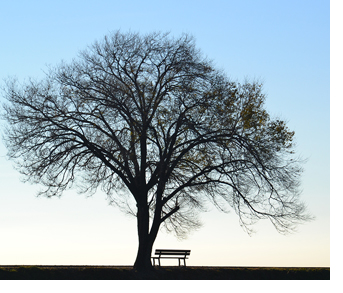
Losing a Spouse Often Too Hastily Linked to Depression
March 3, 2015—A new study by researchers at KU Leuven, in Belgium, has found that loneliness brought about by the death of a spouse can trigger a wider network of depression-like symptoms - but that doctors are often too quick to attribute these symptoms to depression.
The study, published in the Journal of Abnormal Psychology, examined depression symptoms in recently widowed elderly people.
The researchers followed 515 married men and women age 65 or older across time. 241 individuals who lost a spouse during the course of the study were invited to follow-up interviews six months after loss, together with an equally large still-married control group. The researchers then examined and compared the depression symptoms reported by the two groups.
This produced two key findings, explains lead author Dr. Eiko Fried: "First, we found that spousal loss causes a very small number of specific depression symptoms, the most important of which was loneliness. Second, we observed that these few initial depression symptoms in turn trigger a specific network of subsequent depression symptoms."
The findings support a growing body of literature suggesting that specific adverse life events such as losing a loved one lead to specific depression symptom profiles, say the researchers.
"This has implications for prevention and intervention in elderly bereaved people," says Dr. Fried. "Instead of targeting depression in general, specifically targeting key symptoms such as loneliness may prevent the activation of further symptoms in a person's psychopathological network and prevent the development of a full-fledged depression."
Adding to the researchers' concern is the fact that the DSM-5—the manual used by health professionals to diagnose mental disorders such as depression—removed the distinction between depression and bereavement in its newest version, published in 2013. "This has been a topic of huge debate, and we fear that in many people who exhibit a normal grief response after losing their partner, normal sadness may be misdiagnosed as pathological depression," says Dr. Fried.
The study is the first to empirically evaluate the 'network' approach in order to parse out the association between spousal loss and depressive symptoms.
ARTICLE:
"From Loss to Loneliness: The Relationship Between Bereavement and Depressive Symptoms," Fried, Eiko I.; Bockting, Claudi; Arjadi, Retha; Borsboom, Denny; Amshoff, Maximilian; Cramer, Angélique O. J.; Epskamp, Sacha; Tuerlinckx, Francis; Carr, Deborah; Stroebe, Margaret. Journal of Abnormal Psychology, Mar 2 , 2015, No Pagination Specified. doi: http://dx.doi.org/10.1037/abn0000028.
